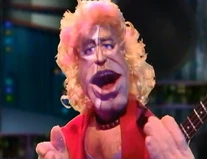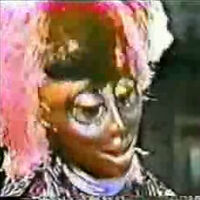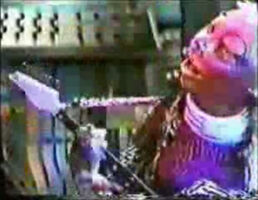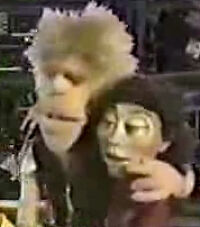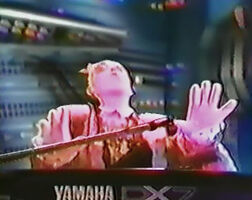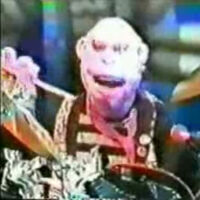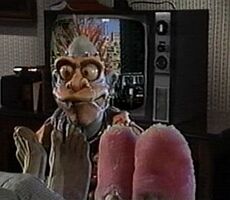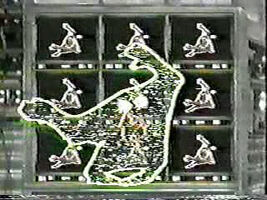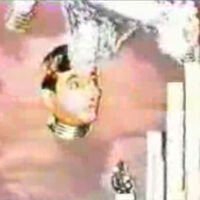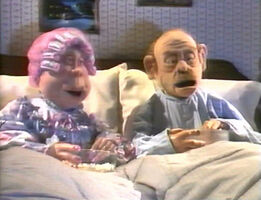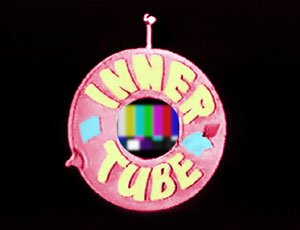
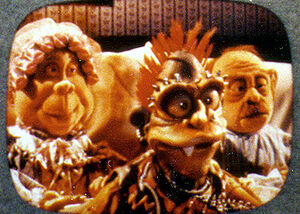
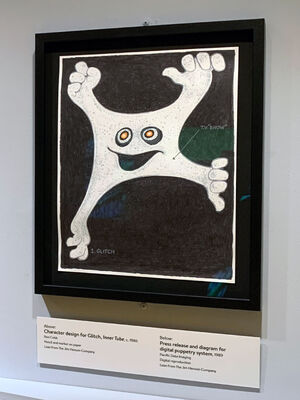
Inner Tube (originally titled IN-TV)[1] was a concept for a television series developed by Jim Henson in 1987. The concept was later revisited with Henson's pitch for Lead-Free TV, which would itself evolve into what became the MuppeTelevision segments of The Jim Henson Hour.
A pilot for the series was written by David Misch; and Henson produced and directed a 10-minute pitch reel for the show between January 15-17, 1987.[2]
Brian Jay Jones explained the concept for the show in Jim Henson: The Biography:
John Candy was originally scripted as the guest star for the pilot, but in the end no guest star appeared.[3]
Henson had some apprehensions about the original pilot script; and creative consultant Larry Mirkin called it "consistently dark, victimized, and pessimistic" with feelings that it was also unfunny.[1] Henson still thought the concept had potential and spent three days taping the pilot, which he edited down to a 10-minute pitch reel. Originally the show was to focus on a brand-new set of Muppet characters, and according to writer David Misch, the pilot was not meant to resemble The Muppet Show.[3] However, Kermit the Frog and Miss Piggy were eventually given brief appearances in the pitch reel in an attempt to better help Henson sell the series. Bernie Brillstein tried selling the show to NBC and other networks, but found no takers.
Although the new puppet characters were made of foam latex (similar in style to those of The Ghost of Faffner Hall and Mother Goose Stories, and thus an indication that they could have been created by the Creature Shop), they were actually built by the New York Muppet Workshop. The new characters were performed by Dave Goelz, Steve Whitmire (credited as Steve Whitmore), Richard Hunt, Kevin Clash, Camille Bonora, Kathryn Mullen, David Rudman, Rick Lyon, and John Henson.
Several of the puppets were later recycled in The Jim Henson Hour. In the pitch reel for The Jim Henson Hour, clips from the Inner Tube pilot are shown as a representation of "Lead-Free TV. Several scenes from the pilot can also be seen in the television special The World of Jim Henson.
Characters
The Mechanics
"Inner Tube," a fly-by-night cable network in the back of an electronics shop, is run by two harried, nutty mechanics:
- Jake, a heavy man with a mustache. He is knowledgeable, patient, and in charge, but not always the most observant. Performed by Dave Goelz.
- Henry, a thinner taller man. He is not so smart, and things must be explained to him often, but he frequently notices what's going on before Jake does. Performed by Steve Whitmire.
The Band
One of the channels Jake and Henry broadcast is the domain of an unnamed futuristic rock band:
- Duke, a big-haired lead male vocalist and guitarist. He tries to assume leadership of the band but the others, not feeling the need for a leader, tease him about it. His guitar is a headless Steinberger-type, possibly a bass. Performed by Steve Whitmire.
- Maya, a silver-skinned female vocalist and guitarist. She has a sort of Jamaican accent. Performed by Camille Bonora. The puppet seems to have been recycled into a backup singer in The Jim Henson Hour episode 107.
- Digit, a wire-haired, robot-voiced keyboardist. This character later showed up in The Jim Henson Hour, with a different voice and personality. Performed by Dave Goelz.
- The nameless Inner Tube Drummer is a deep-voiced, older-sounding balding man, who seems not too impressed by technology. Performed by Kevin Clash. The puppet would resurface as North York on Brats of the Lost Nebula.
The Troublemakers
- Crasher: a wild, loudmouthed punk character who likes crashing through things. Two versions of Crasher were used on the show: a puppet, performed and voiced by Richard Hunt, and a full body costume, performed by John Henson, which allowed him to run or climb into a TV screen.
- Glitch: an animation that would mischievously interrupt transfer.
- Zaloom, a live-actor channel pirate with no channel of his own. He hijacks the channels of others, using technology to get his anti-technology message out. He was played by Paul Zaloom, best known as Beakman from the Saturday morning series Beakman's World.
The Viewers
- Chet and Babs, an older couple watching TV in bed. Chet is performed by Rick Lyon, and Babs by Kathy Mullen. They're mildly surprised when Crasher burts from their TV into their bedroom, but assume that it's merely an unusually realistic special effect. The Babs puppet later appeared as a supermarket shopper in the "Food" episode of The Jim Henson Hour.
Channels
Aerobics Channel: hosted by Miss Piggy, who says that if you do your daily dozen with someone you love, exercise can be less boring. (This scene is reused footage from the "Lift the One You Love" music video)
Millionaire's Home Shopping Network: hosted by the Salesman (played by Rick Lyon), the channel sells really expensive things, including Denmark, for $200,199,622,122.95.
All-Kitchen-Utensil Network: a channel that adapts stories for a kitchenware cast.
Notes
- Footage seen on the various monitors include:
- "Java" from episode 122 of The Muppet Show
- "Hawaiian War Chant" from episode 320 of The Muppet Show
- A clip from Rowlf's Rhapsodies with the Muppets
- The Galley-oh-hoop-hoop from episode 107 of The Muppet Show
- "That Old Black Magic" from Sam and Friends
- The "All Around the World" music video
- "Ain't No Hole in the Washtub" from Emmet Otter's Jug-Band Christmas
Credits
Directed by:
Jim Henson
Written by:
David Misch
Music and Lyrics:
Phil Ramone, Bob Halligan, and Phil Galdston
Muppet Performers:
Dave Goelz, Steve Whitmore (sic), Richard Hunt, Kevin Clash, Camille Bonora, Kathryn Mullen, David Rudman, Rick Lyon, and John Henson
Character Design:
Michael Frith, John Stevenson, and Bob Taylor
Muppet Design Group:
Jane Gootnick, Ed Christie, Tim Miller, Jan Rosenthal, Norman Tempia, Joanne Green, Marian Keating, Jitka Exler, Colleen Henry, and Rollie Krewson
Costumes:
Polly Smith, Julie Zobel, and Connie Peterson
Muppet Mechanical Design:
Larry Jameson, Tom Newby, and Fred Buchholz
Workshop Supervisor:
Will Morrison
Backgrounds and Electronic Effects by:
CHARLEX
Production Executives:
Charles Levi and Ralph Horan
Producers:
Peter Mavromates and Ritamarie Peruggi
Edited by:
Bill Weber
Paintbox Artist:
Page Wood and Gordon DeWolf
Art Direction:
Malcom McNeil and Alex Weil
Visual Futurist:
David Gumpel
Copyright Henson Associates Inc. 1987
See also
Sources
- ↑ 1.0 1.1 1.2 Jim Henson: The Biography by Brian Jay Jones (pages 400-401)
- ↑ Imagination Illustrated: The Jim Henson Journal, page 171
- ↑ 3.0 3.1 Misch, David. Tough Pigs interview.


